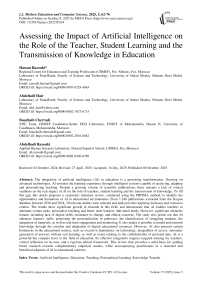Assessing the Impact of Artificial Intelligence on the Role of the Teacher, Student Learning and the Transmission of Knowledge in Education
Автор: Hassan Razouki, Abdellatif Hair, Bouchaib Cherradi, Abdelhadi Razouki
Журнал: International Journal of Modern Education and Computer Science @ijmecs
Статья в выпуске: 5 vol.17, 2025 года.
Бесплатный доступ
The integration of artificial intelligence (AI) in education is a promising transformation. Drawing on advanced technologies, AI enriches the learning experience through intelligent systems capable of analyzing, adapting and personalizing teaching. Despite a growing volume of scientific publications, there remains a lack of critical synthesis on the real impact of AI on the role of teachers, student learning and the transmission of knowledge. To fill this gap, this article proposes a systematic literature review, conducted using the PRISMA method, to identify the opportunities and limitations of AI in educational environments. From 1,248 publications extracted from the Scopus database between 2018 and 2024, 20 relevant studies were selected and analyzed after applying inclusion and exclusion criteria. The results show significant growth in research in this field, and demonstrate that AI enables teachers to automate certain tasks, personalize teaching and better meet learners' individual needs. However, significant obstacles remain, including lack of digital skills, resistance to change, and ethical concerns. The study also points out that AI enhances learners' skills, promoting the personalization of pathways, the identification of struggling students, the adaptation of materials, as well as real-time engagement and monitoring. It also makes it possible to model and transmit knowledge through the creation and adaptation of digital educational resources. However, AI also presents certain limitations in the educational context, such as excessive dependence on technology, inequalities of access, automatic generation of answers without real learning, as well as issues relating to the confidentiality of personal data. AI is a powerful but complex lever in the field of education. Its effective integration requires targeted training for teachers, critical reflection on its uses, and a rigorous ethical framework. This review thus provides a solid basis for guiding future research towards complementary empirical studies, while accompanying practitioners in a reasoned and beneficial adoption of AI in educational contexts.
Artificial Intelligence, Education, Teaching, Personalized Learning, Knowledge Transfer
Короткий адрес: https://sciup.org/15019970
IDR: 15019970 | DOI: 10.5815/ijmecs.2025.05.04


